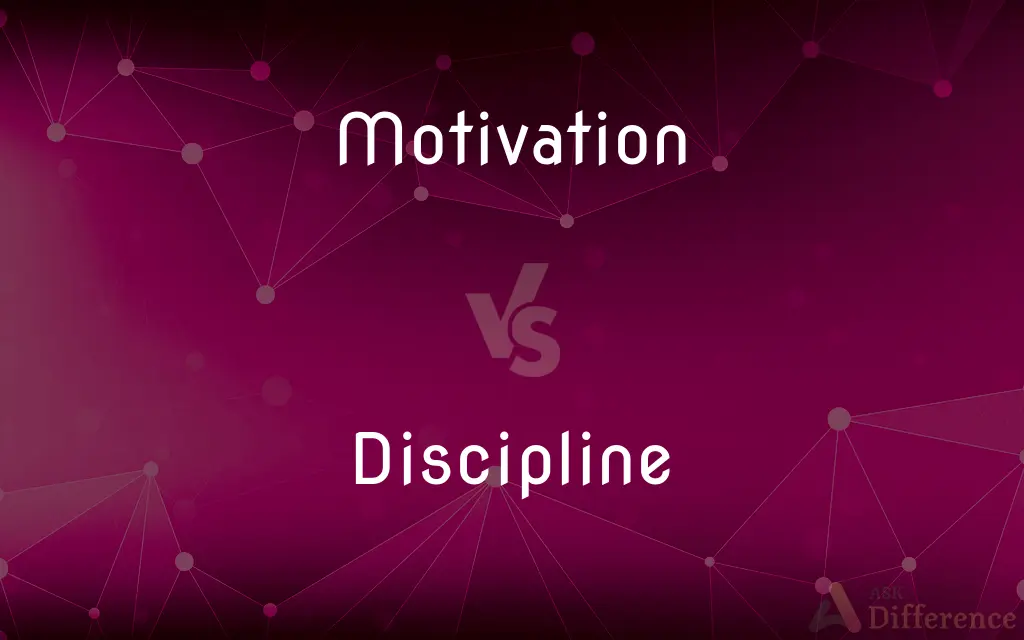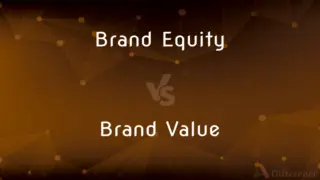Motivation vs. Discipline — What's the Difference?
By Tayyaba Rehman & Fiza Rafique — Published on October 3, 2023
Motivation is the emotional drive or reason for taking action, while Discipline is the self-control and routine required to take consistent action, regardless of emotional state.

Difference Between Motivation and Discipline
Table of Contents
ADVERTISEMENT
Key Differences
Motivation is an emotional or psychological impulse that drives individuals to perform certain actions. It can be sparked by both internal factors like passion and external factors like rewards. Discipline, on the other hand, is a set of behaviors and routines that enable individuals to take consistent actions over time, regardless of their emotional state.
Motivation is often the initial push that gets you started on a task or goal, offering a sense of enthusiasm and drive. Discipline, conversely, is what keeps you going even when that initial enthusiasm fades. It’s the ability to maintain a commitment and follow through with actions, whether you feel like it or not.
In a working or learning environment, motivation can lead to short bursts of productive energy, often triggered by deadlines or rewards. Discipline ensures sustained effort over time, fostering habits that lead to long-term achievement and mastery of skills.
Motivation is generally more volatile and can be influenced by external conditions such as mood, environment, and people around you. Discipline, by contrast, is more stable and rooted in your character, enabling you to persevere even when motivational triggers are absent.
Comparison Chart
Basis
Emotional/psychological
Behavioral/routine
ADVERTISEMENT
Sustainability
Often short-term
Long-term
Influenced by
Internal/External factors
Character/Training
Consistency
Varies
Steady
Dependence on mood
High
Low
Compare with Definitions
Motivation
Emotional Drive: "Motivation is the emotional push to act."
His motivation to excel comes from wanting to make his parents proud.
Discipline
Self-Control: "Discipline involves self-control and restraint."
Discipline keeps him from overspending.
Motivation
Goal-Oriented: "Motivation is focused on reaching specific objectives."
Her motivation is to get a promotion at work.
Discipline
Habitual: "Discipline is about creating and following routines."
Her discipline in practicing the piano daily led to mastery.
Motivation
Internal/External Triggers: "Motivation can be sparked by internal or external factors."
Money serves as a powerful motivation for many people.
Discipline
Independent: "Discipline doesn't rely on external factors."
His discipline in studying is not tied to immediate rewards.
Motivation
Temporary: "Motivation can be short-lived."
The motivational speech boosted their spirits temporarily.
Discipline
Character-Based: "Discipline is a reflection of one's character."
His discipline in work shows his commitment and reliability.
Motivation
Volatile: "Motivation fluctuates based on various factors."
His motivation to exercise wanes in the winter months.
Discipline
Long-Term: "Discipline is geared toward long-term consistency."
Discipline helped her maintain a healthy lifestyle over the years.
Motivation
The act or process of motivating
The coach's effective motivation of her players.
Discipline
Training expected to produce a specific character or pattern of behavior, especially training that produces moral or mental improvement
Was raised in the strictest discipline.
Motivation
The state of being motivated; having a desire or willingness to act
Students with a high level of motivation.
Discipline
Control obtained by enforcing compliance or order
Military discipline.
Motivation
Something that motivates; an inducement, reason, or goal
“If your primary motivation in life is to be moral, you don't become an artist” (Mary Gordon).
Discipline
Controlled behavior resulting from disciplinary training; self-control
Dieting takes a lot of discipline.
Motivation
Willingness of action especially in behavior.
Discipline
A state of order based on submission to rules and authority
A teacher who demanded discipline in the classroom.
Motivation
The action of motivating.
Discipline
Punishment intended to correct or train
Subjected to harsh discipline.
Motivation
Something which motivates.
Discipline
A set of rules or methods, as those regulating the practice of a church or monastic order.
Motivation
An incentive or reason for doing something.
Discipline
A branch of knowledge or teaching
The discipline of mathematics.
Motivation
(advertising) A research rating that measures how the rational and emotional elements of a commercial affect consumer intention to consider, visit, or buy something.
The motivation scores showed that 65% of people wanted to visit our website to learn more about the offer after watching the commercial.
Discipline
To train by instruction and practice, as in following rules or developing self-control
The sergeant disciplined the recruits to become soldiers.
Motivation
The act or process of motivating.
Discipline
To punish in order to gain control or enforce obedience.
Motivation
The mental process that arouses an organism to action; as, a large part of a teacher's job is to give students the motivation to learn on their own.
Discipline
To impose order on
Needed to discipline their study habits.
Motivation
The goal or mental image of a goal that creates a motivation{2}; as, the image of a peaceful world is a powerful motivation for only a rare few individuals.
Discipline
A controlled behaviour; self-control.
Motivation
The psychological feature that arouses an organism to action toward a desired goal; the reason for the action; that which gives purpose and direction to behavior;
We did not understand his motivation
He acted with the best of motives
Discipline
An enforced compliance or control.
Motivation
The condition of being motivated;
His motivation was at a high level
Discipline
A systematic method of obtaining obedience.
Motivation
The act of motivating; providing incentive
Discipline
A state of order based on submission to authority.
Discipline
A set of rules regulating behaviour.
Discipline
A punishment to train or maintain control.
Discipline
A specific branch of knowledge or learning.
Discipline
A category in which a certain art, sport or other activity belongs.
Discipline
(transitive) To train someone by instruction and practice.
Discipline
(transitive) To teach someone to obey authority.
Discipline
(transitive) To punish someone in order to (re)gain control.
Discipline
(transitive) To impose order on someone.
Discipline
The treatment suited to a disciple or learner; education; development of the faculties by instruction and exercise; training, whether physical, mental, or moral.
Wife and children are a kind of discipline of humanity.
Discipline aims at the removal of bad habits and the substitution of good ones, especially those of order, regularity, and obedience.
Discipline
Training to act in accordance with established rules; accustoming to systematic and regular action; drill.
Their wildness lose, and, quitting nature's part,Obey the rules and discipline of art.
Discipline
Subjection to rule; submissiveness to order and control; habit of obedience.
The most perfect, who have their passions in the best discipline, are yet obliged to be constantly on their guard.
Discipline
Severe training, corrective of faults; instruction by means of misfortune, suffering, punishment, etc.
A sharp discipline of half a century had sufficed to educate us.
Discipline
Correction; chastisement; punishment inflicted by way of correction and training.
Giving her the discipline of the strap.
Discipline
The subject matter of instruction; a branch of knowledge.
Discipline
The enforcement of methods of correction against one guilty of ecclesiastical offenses; reformatory or penal action toward a church member.
Discipline
Self-inflicted and voluntary corporal punishment, as penance, or otherwise; specifically, a penitential scourge.
Discipline
A system of essential rules and duties; as, the Romish or Anglican discipline.
Discipline
To educate; to develop by instruction and exercise; to train.
Discipline
To accustom to regular and systematic action; to bring under control so as to act systematically; to train to act together under orders; to teach subordination to; to form a habit of obedience in; to drill.
Ill armed, and worse disciplined.
His mind . . . imperfectly disciplined by nature.
Discipline
To improve by corrective and penal methods; to chastise; to correct.
Has he disciplined Aufidius soundly?
Discipline
To inflict ecclesiastical censures and penalties upon.
Discipline
A branch of knowledge;
In what discipline is his doctorate?
Teachers should be well trained in their subject
Anthropology is the study of human beings
Discipline
A system of rules of conduct or method of practice;
He quickly learned the discipline of prison routine
For such a plan to work requires discipline
Discipline
The trait of being well behaved;
He insisted on discipline among the troops
Discipline
Training to improve strength or self-control
Discipline
The act of punishing;
The offenders deserved the harsh discipline they received
Discipline
Train by instruction and practice; especially to teach self-control;
Parents must discipline their children
Is this dog trained?
Discipline
Punish in order to gain control or enforce obedience;
The teacher disciplined the pupils rather frequently
Common Curiosities
What is Discipline?
Discipline is the ability to regulate oneself for improvement or achieving goals.
What is Motivation?
Motivation is the psychological or emotional impetus to take action.
How does Motivation work?
Motivation often operates through a reward-punishment mechanism, either internal or external.
Is Motivation always needed?
While motivation can provide an initial spark, it’s often not sustainable for long-term goals.
Is Discipline more reliable than Motivation?
Generally, discipline is more reliable for long-term consistency.
Can you have Motivation without Discipline?
Yes, but it may not sustain long-term action and may lead to inconsistency.
Is Motivation emotional?
Motivation is often emotional and can be influenced by mood and feelings.
Is Discipline rational?
Discipline is usually rational and tends to be less affected by emotional states.
Can you have Discipline without Motivation?
Yes, discipline can sustain actions even when motivation wanes.
How to improve Motivation?
Identifying triggers, setting achievable goals, and positive reinforcement can boost motivation.
Are Motivation and Discipline mutually exclusive?
No, they can complement each other; motivation can initiate action while discipline maintains it.
How does Discipline work?
Discipline works through habitual action and self-control, often independent of mood or external factors.
How does Motivation affect performance?
Motivation can boost performance in the short term by focusing energy and attention.
How to build Discipline?
Consistent routines, self-control techniques, and gradual habit-building can foster discipline.
How does Discipline affect performance?
Discipline often leads to improved long-term performance through consistent effort and practice.
Share Your Discovery

Previous Comparison
Brand Equity vs. Brand Value
Next Comparison
Protein vs. FatAuthor Spotlight
Written by
Tayyaba RehmanTayyaba Rehman is a distinguished writer, currently serving as a primary contributor to askdifference.com. As a researcher in semantics and etymology, Tayyaba's passion for the complexity of languages and their distinctions has found a perfect home on the platform. Tayyaba delves into the intricacies of language, distinguishing between commonly confused words and phrases, thereby providing clarity for readers worldwide.
Co-written by
Fiza RafiqueFiza Rafique is a skilled content writer at AskDifference.com, where she meticulously refines and enhances written pieces. Drawing from her vast editorial expertise, Fiza ensures clarity, accuracy, and precision in every article. Passionate about language, she continually seeks to elevate the quality of content for readers worldwide.














































